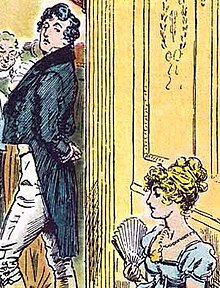Mr. Fitzwilliam Darcy
| Fitzwilliam Darcy | |
|---|---|

Mr. Darcy and Elizabeth Bennet by C. E. Brock (1895)
She is tolerable, but not handsome enough to tempt me. |
|
| Full name | Mr. Fitzwilliam Darcy |
| Gender | Male |
| Age | 28 |
| Income | £10,000+/year |
| Primary residence | Pemberley, near Lambton, Derbyshire |
| Family | |
| Spouse(s) | Elizabeth Bennet |
| Romantic interest(s) | Elizabeth Bennet |
| Parents | Mr. Darcy and Lady Anne Darcy (née Fitzwilliam) |
| Sibling(s) | Georgiana Darcy |
Fitzwilliam Darcy, generally referred to as Mr. Darcy, is one of the two central characters in Jane Austen's novel Pride and Prejudice. He is an archetype of the aloof romantic hero, and a romantic interest of Elizabeth Bennet, the novel's protagonist. The story's narration is almost exclusively from Elizabeth's perspective; she is portrayed as the sympathetic figure, and Darcy hardly so until the later chapters of the novel—as knowledge and ironic events are revealed to Elizabeth. Usually referred to only as "Mr. Darcy" or "Darcy" by characters and the narrator, his first name is mentioned twice in the novel.
In the novel, Mr. Darcy is a wealthy gentleman with an income exceeding £10,000 a year, and the proprietor of Pemberley, a large estate in Derbyshire, England. Darcy first meets Elizabeth Bennet at a ball, where he slights her by refusing to dance with her, and by making rather demeaning remarks about her while she is within earshot. Gradually he becomes attracted to her and later attempts to court her while simultaneously struggling against his continued feelings of superiority. Ironically, Darcy disapproves when his friend Bingley develops a serious attachment to Elizabeth's elder sister Jane, and subtly persuades Bingley that Jane does not return his feelings (which Darcy honestly believes). He later explains this seeming hypocrisy by asserting "I was kinder to [Mr. Bingley] than to myself". Although he doesn't realize it, Elizabeth's discovery of Darcy's interference in Bingley and Jane's budding relationship, and Mr. Wickham's tale of how Darcy mistreated him, has caused her to dislike him intensely.
Eventually, Mr. Darcy declares his love for Elizabeth and offers her a proposal of marriage. He reminds her of the large gap in their social status. Elizabeth is offended and vehemently refuses him, expressing her reasons for disliking him, including her knowledge of his interference with Jane and Bingley and the account she received from Mr. Wickham of Darcy's alleged unfair treatment toward him. Insulted by Darcy's arrogant retorts, Elizabeth claims that the way by which he proposed to her prevented her from feeling concerns for him she "might have felt had you behaved in a more gentlemanlike manner". Darcy departs in anger and mortification and that night writes a letter to Elizabeth in which he defends his wounded honour, reveals the motives for his interference in Jane and Bingley's relationship, and gives a full account of his lifelong dealings with Wickham, who had attempted to seduce and elope with Darcy's younger sister, Georgiana, the previous summer.
...
Wikipedia
